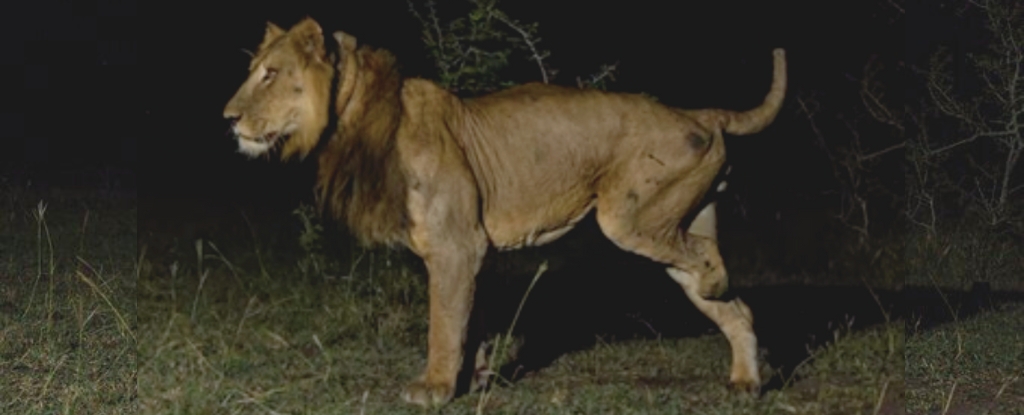A pair of lion brothers have been captured on video taking a death-defying 1-kilometer (0.6-mile) swim across a Ugandan river packed with predators – a sign of increasing human-caused pressures forcing animals to take more risks.
The brothers, Jacob and Tibu, crossed the Kazinga Channel at night. It’s the first visually documented long-distance swim for African lions (Panthera leo), and it involved a couple of false starts.
Researchers recorded potential predators possibly trailing the lion duo before they successfully made it across. In collaboration with the Uganda Wildlife Authority, the international team tracked their movements using heat-detecting drone cameras.
“Lions are known to hunt both crocodiles and hippos on occasion, but when in water they themselves become vulnerable,” the researchers write in their published paper.
“River crossings in Africa come with considerable risk of injury, or even death, from encounters with the much larger Nile crocodile or hippopotamus.”
Jacob is particularly well known to local experts. The 10-year-old has already survived poisoning by poachers and a goring from a buffalo, and he had to have one of his legs amputated after being caught in a trap during another attempt at poaching.
“His swim, across a channel filled with high densities of hippos and crocodiles, is a record-breaker and is a truly amazing show of resilience in the face of such risk,” says the study’s first author, conservation biologist Alexander Braczkowski from Griffith University in Australia.
frameborder=”0″ allow=”accelerometer; autoplay; clipboard-write; encrypted-media; gyroscope; picture-in-picture; web-share” referrerpolicy=”strict-origin-when-cross-origin” allowfullscreen>
“The fact that he and his brother Tibu have managed to survive as long as they have in a national park that has experienced significant human pressures and high poaching rates is a feat in itself,” Braczkowski adds.
The reason for Jacob and Tibu’s adventure? Most likely, finding females to mate with. However, this is less a story of romantic courage, and more a sobering tale about a lion population that has been decimated by poaching and expanding human activity across Queen Elizabeth National Park.
“Our science has shown this population has nearly halved in just five years,” says Braczkowski.
Indeed, there is a road bridge that the lions could’ve used more safely – but conservationists think that the presence of people on and around the bridge, which is currently being guarded by the Uganda Peoples’ Defense Force, would’ve put the brothers off using it.
Instead, researchers have observed lions choose the far-riskier, croc- and hippo-infested lake channel crossing six times.
“Competition for lionesses in the park is fierce and they lost a fight for female affection in the hours leading up to the swim, so it’s likely the duo mounted the risky journey to get to the females on the other side of the channel,” says Braczkowski.
The team behind the newly documented swim says it fits into a bigger picture of wildlife being forced into tough decisions as their options and resources become more limited – mostly because of what we are doing to the planet.
This isn’t the first time the researchers have seen long swims by the lions in this area, but it is the first time they’ve managed to get it on film. They’re continuing to work to monitor lion populations in the park – including Jacob and Tibu.
“Jacob has had the most incredible journey and really is a cat with nine lives,” says Braczkowski. “I’d bet all my belongings that we are looking at Africa’s most resilient lion.”
The research has been published in Ecology & Evolution.





















Discussion about this post